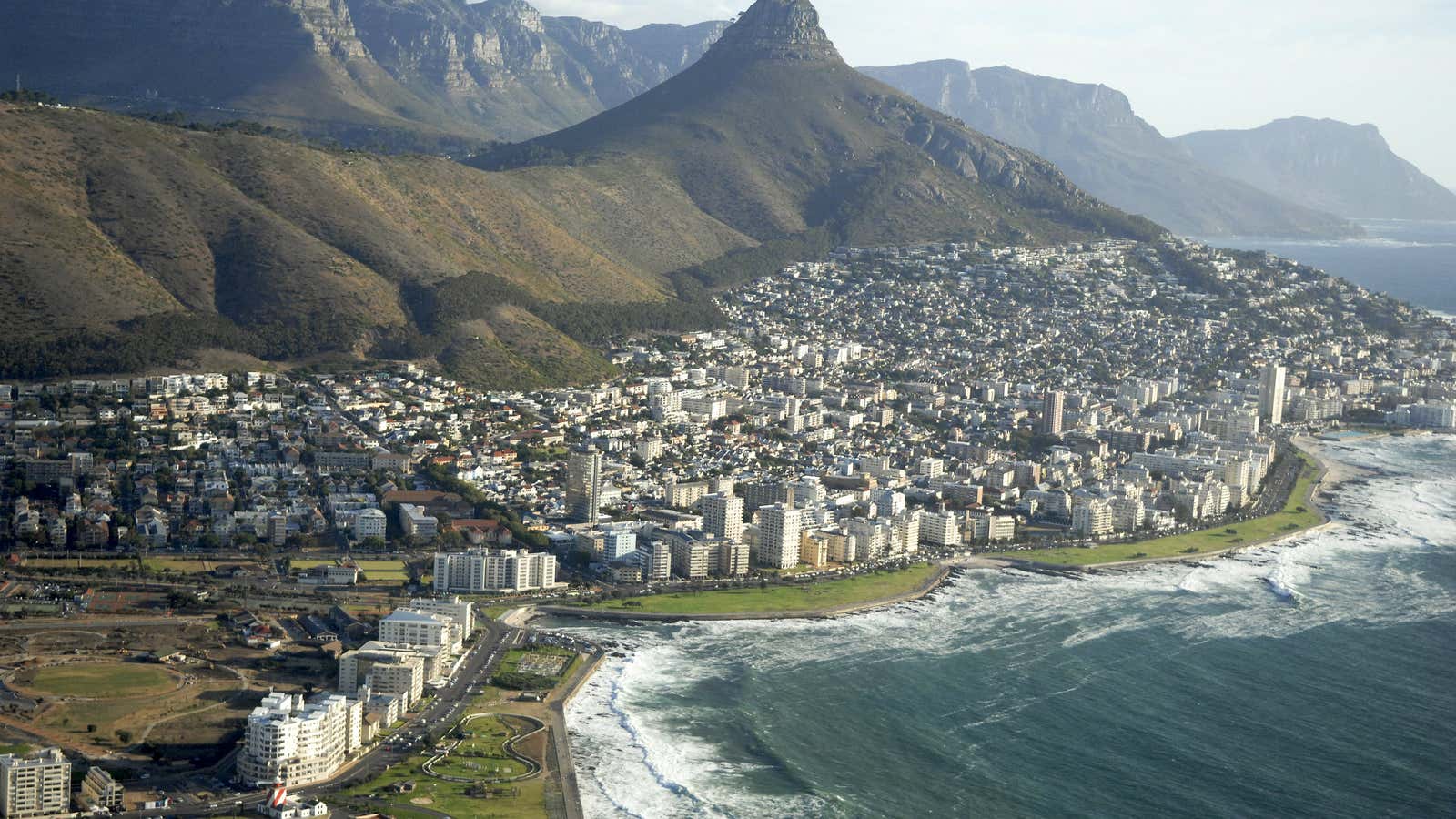For people who know it, Cape Town is a city that can feel defined by its mind-boggling levels of inequality. But for travelers being catered to by the city’s sophisticated luxury travel market, Cape Town’s rampant challenges often stay shielded from view.
However, the city’s increasingly severe water crisis—which has Cape Town officials warning that “Day Zero,” when the city will turn off its taps, could come as soon as late April—is a reality that even the city’s finest hotels aren’t shielding their guests from. In fact, as a whole, five star and ultra luxury properties are responding to the crisis with an urgency that is somewhat surprising—especially when you consider the types of wealthy guests they generally serve.
“It would be irresponsible for us to not fully partake in all the water savings that we can just because we’re in the ultra luxury segment,” says Richard Lyon, the general manager of the One&Only Cape Town, one of the city’s most upscale properties in a crowded field. Lyon says the hotel is currently aiming to reduce its water consumption by up to 50% compared to this time last year (it has already decreased it by more than 30%, which the municipality requires).
Many of the changes that One&Only and other high-end hotels have implemented are the kind of efficiency gains that make one wonder why they weren’t in place already. These include switching to low-flow shower heads and taps, washing cars less, converting fountains into rock gardens, topping up swimming pools with treated salt or recycled water, using native and/or succulent plants, collecting unused water from ice buckets and half-empty water bottles throughout back-of-house operations, and washing linens every few days or once per stay rather than daily.
Others, though, are the kinds of changes that certainly have an effect on the guest’s experience. For example, how would you feel if you were paying some $800 to $1,000 per night and couldn’t take a bath in your hotel room? Or if there is a bucket in your shower to collect water? Or if you were told you couldn’t enjoy certain spa treatments or sauna/steam room sessions? These are all steps some super high-end properties have taken.
“We’ve taken the bath plugs out of our baths. But if somebody says ‘I’ve got a medical condition, I need to bath rather than shower’—or they really want their linens changed every day—then we’ll work with them. But that’s the very small minority,” Lyon said. He added that guests don’t seem perturbed: “If you look at our guest satisfaction scores, we are tracking higher for every month of higher than the year prior.”
One&Only is not an outlier. Quartzy spoke to three other well known luxury properties—including the Cape Grace Hotel, the 12 Apostles Hotel and Spa, and one other who preferred not to be named—who had all implemented similar methods. A representative from the 12 Apostles sent a document outlining their 35-point action plan, which they noted had already led to a 42% reduction in consumption compared to this time last year. Many hotels have also joined the #SaveLikeaLocal campaign.
Jeff Rosenberg is the head of the Federated Hospitality Association of South Africa—the country’s leading trade organization for the hospitality industry—which has launched a WaterWise Pledge to advise member hotels on tips for conservation. He said other than a small minority of travelers who complain, the reception has been overwhelmingly understanding.
“I’m very happy to say that the majority of the luxury hotel market has bought into the process and the majority of our international guests have also understood what we’re trying to do,” Rosenberg said. “I know of certain instances in luxury hotels where the manager has gotten very firm with the guest in explaining the reasoning behind it. One guest actually checked out and went to another five star hotel, where they ran into the same situation.”
Known for its dramatic mountain-meets-coast landscape and almost surreal natural beauty, Cape Town, both Rosenberg and Lyon suggest, has a knack for luring the kinds of visitors with a built-in awareness for conservation and ecologically-sound practices. In fact, Lyon said: “I think people actually get quite a bit of pleasure from feeling like they’re making a contribution.”
Communication up front has helped too. Luxury properties including One&Only and Cape Grace are notifying guests at the time of reservation that the city is facing water shortages that could have a noticeable effect on their stay—and encouraging them to help out. They are then reminded of the crisis again when they check in, with welcome letters as well as sign postings throughout the properties. Some hotels, instead of removing bath plugs, have put notes on them asking guests to take a two minute shower instead. When it comes to swimming pools—something that could make or break a guest’s decision to book—Rosenberg said most hotels have found ways to adapt and keep them open, while “some have actually closed the pools where they don’t have any [sustainable] option.”
Luxury travel agent Abercrombie & Kent, which specializes in many Africa itineraries including Cape Town, has also been proactive in alerting travelers before they get on the plane.
“When traveling to a destination Abercrombie & Kent always advise our guests on how best to be responsible travelers, from observing cultural sensitivities to awareness of environmental impact,” Ross Pakes, Director of Product for Abercrombie & Kent said. “Our team on the ground is keeping a close eye on the situation and advising our guests and global teams on a regular basis.”
In this case, Cape Town’s luxury sector is certainly not hiding the challenges from their well-heeled guests. For the industry, as Rosenberg said, it’s an attitude of “we’re all in this together.”
